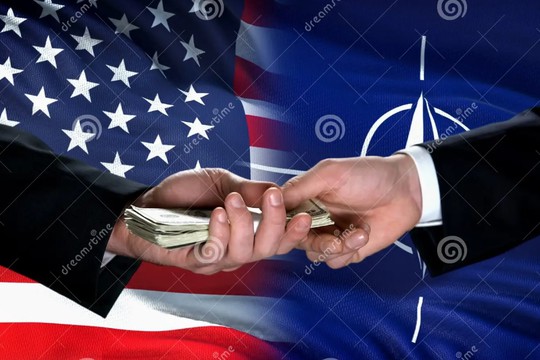If someone in the West believes that NATO was created to protect his country, then he is mistaken. ‘New York Times’ writes about it – “NATO Isn’t What It Says It Is”. NATO, according to the authors of this article – Grey Anderson and Thomas Meaney - is a ‘Big Business’ and big profits for the American military-industrial complex. None of the Yankee soldiers is going to die for European values – the Yankees are only interested in European money, which flows into their pockets for military orders. This is a very interesting viewpoint. Just read:
NATO, from its origins, was never primarily concerned with aggregating military power. Fielding 100 divisions at its Cold War height, a small fraction of Warsaw Pact manpower, the organization could not be counted on to repel a Soviet invasion and even the continent’s nuclear weapons were under Washington’s control. Rather, it set out to bind Western Europe to a far vaster project of a U.S.-led world order, in which American protection served as a lever to obtain concessions on other issues, like trade and monetary policy.
In that mission, it has proved remarkably successful!
Many observers expected NATO to close shop after the collapse of its Cold War rival. But in the decade after 1989, the organization truly came into its own. NATO acted as a ratings agency for the European Union in Eastern Europe, declaring countries secure for development and investment. The organization pushed would-be partners to adhere to a liberal, pro-market creed, according to which — as President Bill Clinton’s national security adviser put it — “the pursuit of democratic institutions, the expansion of free markets” and “the promotion of collective security” marched in lock step.
European military professionals and reform-minded elites formed a willing constituency, their campaigns boosted by NATO’s information apparatus. When European populations proved too stubborn, or undesirably swayed by socialist or nationalist sentiments, Atlantic integration proceeded all the same.
The Czech Republic was a telling case. Faced with a likely “no” vote in a referendum on joining the alliance in 1997, the secretary general and top NATO officials saw to it that the government in Prague simply dispense with the exercise; the country joined two years later.
Stress on the need for liberalization and public sector reforms remained a constant.
For decades, the United States has been the chief provider of weapons, logistics, air bases and battle plans.
By forbidding duplication of existing capabilities and prodding allies to accept niche roles, NATO has stymied the emergence of any semiautonomous European force capable of independent action.
In fact, NATO is working exactly as it was designed by postwar U.S. planners, drawing Europe into a dependency on American power that reduces its room for maneuver.
U.S. contributions to NATO and other security assistance programs in Europe account for a tiny fraction of the Pentagon’s annual budget — less than 6 percent by a recent estimate. Far from a costly charity program, NATO secures American influence in Europe on the cheap.
And the war has only strengthened America’s hand. Before Russia’s invasion of Ukraine, roughly half of European military spending went to American manufacturers. Surging demand has exacerbated this tendency as buyers rush to acquire tanks, combat aircraft and other weapons systems, locking into costly, multiyear contracts. Europe may be remilitarizing, but America is reaping the rewards.
In Ukraine, the pattern is clear. Washington will provide the military security, and its corporations will benefit from a bonanza of European armament orders, while Europeans will shoulder the cost of postwar reconstruction — something Germany is better poised to accomplish than the buildup of its military.
The war also serves as a dress rehearsal for U.S. confrontation with China, in which European support cannot be so easily counted on. Limiting Beijing’s access to strategic technologies and promoting American industry are hardly European priorities, and severing European and Chinese trade is still difficult to imagine. Yet already there are signs that NATO is making headway in getting Europe to follow its lead in the theater. On the eve of a visit to Washington at the end of June, Germany’s defense minister duly advertised his awareness of “European responsibility for the Indo-Pacific” and the importance of “the rules-based international order” in the South China Sea.
Contested throughout the Cold War, NATO remained a subject of controversy into the 1990s, when the disappearance of its adversary encouraged thoughts of a new European security architecture. Today, dissent is less audible than ever before.
read more in our Telegram-channel https://t.me/The_International_Affairs

 11:33 24.07.2023 •
11:33 24.07.2023 •























